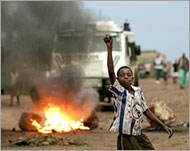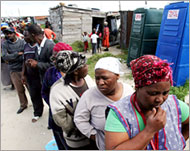S African local polls to test ANC
South Africans have voted in local elections in what is being seen as a popularity test for the ruling African National Congress, which is under fire from supporters demanding better housing and services.

The ANC remains certain to win the elections but has faced increasing criticism and protests for failing to provide housing, electricity, proper sanitation and tap water.
Nelson Mandela, the country’s first black president, said after casting his ballot in Johannesburg: “Every country in the world faces challenges. One of our challenges here is to ensure that we deal with poverty, lack of education.”
Polling stations closed at 7pm (1500 GMT) on Wednesday and voting went smoothly across the country.
Boycott
But in the township of Khutsong, west of Johannesburg, police fired rubber bullets at protesters outside a polling station as residents boycotted the elections.
The population of 170,000 is up in arms over the government’s decision to transfer the town from Gauteng, South Africa’s richest province, to North West, saying that it will leave them with fewer services.
 |
|
Boycotting Khutsong residents |
Albert Mamela, 29, a resident, said: “We the people of Khutsong are not going to vote.
“We have been sold out by the government.”
Tyres burned in the streets and polling stations lay empty as residents vented their fury.
The violence erupted amid nationwide anger over inadequate delivery of municipal services in poor, mostly black areas.
Pepsi Moutlwatsi, another resident, said: “We are trying to send a message to this government.
“There is no deliverance [of services] here. How can we vote?”
Magaba Yekelo, a resident of the crime-ridden township of Khayelitsha in Cape Town, said she had decided not to vote.
“I’m not voting this time. I have not seen any developments. I don’t see what has been done,” she said.
Chance for opposition
The ANC controls all six metropolitan councils including Johannesburg, Cape Town and Durban and all local municipalities in six of the nine provinces.
Cape Town is one of the few areas where the main opposition Democratic Alliance has a chance of defeating the ANC.
 |
|
The DA holds much support in the |
There is additional anger in the city over 10 days of prolonged power cuts.
On Tuesday, the government blamed sabotage at the local nuclear reactor, where a bolt apparently left behind during maintenance last December has crippled one of the two generators.
But critics said the announcement on the eve of the elections was a political ploy, and that lack of capacity by the state electricity company Eskom and lack of planning by the city council were responsible.
Shifting support
The outcome in Cape Town will hinge on the city’s mixed-race community, which makes up nearly half the population.
Some members of the mixed-race community claim that the ANC has promoted the interests of black South Africans and ignored their needs.
|
“The ANC looks after its own. Only a few people get a piece of the cake” John Robert,Cape Town resident |
John Robert, who voted for the ANC last time but was now switching to the Democratic Alliance, said: “The ANC looks after its own.
“Only a few people get a piece of the cake.”
Robert, who lives in the poor mixed-race fishing community of Hout Bay, just outside Cape Town, said that no new houses had been built in his neighbourhood and that soaring unemployment among fishermen was forcing him into illegal poaching.
But Veronica Adonis, a 61-year-old fish factory worker, said: “The government is doing nice work. It takes time. Progress won’t happen overnight.
“During apartheid we faced a struggle, but now we find open doors. We have freedom and we are happy.”
Mbeki hopeful
Thabo Mbeki, the president, was one of the first to vote in the capital, Pretoria, and urged the nation’s 21 million registered voters to cast their ballot “because we need a very strong and legitimate local government”.
 |
|
Mbeki said a strong and legitimate |
The ANC has also been plagued by infighting since Mbeki fired Jacob Zuma, his former deputy who is facing corruption and rape charges.
In the last municipal elections in 2000, the ANC won 59% of the vote, with the Democratic Alliance 22% and the rest split between smaller parties.
At national elections in 2004, the ANC won an overwhelming 70% majority.
A few isolated problems were reported.
A standoff between rival ANC and Inkatha Freedom Party supporters in KwaZulu-Natal, traditionally the most restive and violence-prone province, forced voting to be temporarily suspended.
But fears that voters would stay away in the rest of the country appeared to be unfounded, with Stephen Langtry, spokesman for the Independent Elections Commission, saying that early indications showed “a very good turnout”.
Turnout figures
Ballot counting was under way at polling stations across the country and the final results are expected at the weekend.
 |
|
Voter turnout figures were |
Voter turnout figures were not yet available but Henni Kotze, a political analyst, said he expected it to be around 40%.
“We are used to voting by now and local elections have always been ‘lower temperature’ elections than national elections,” Kotze told the local SAPA news agency.
Unemployment in South Africa stands at 26% and more than half of the 46 million population lives below the breadline.
Near a Johannesburg voting station, Refilwe, a 36-year-old domestic worker, said she was hoping that her living conditions will improve.
“I am voting today because they say things will get better after the vote but up to now, they have been promising and promising, but they don’t keep their promises,” she said.